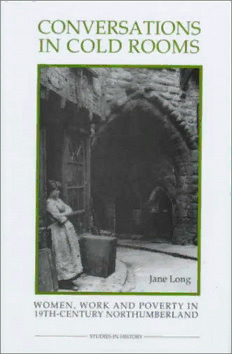
Conversations in Cold Rooms: Women, Work and Poverty in Nineteenth-Century Northumberland (Royal Historical Society Studies in History New Series) PDF
01999·0.875 MB·English
Most books are stored in the elastic cloud where traffic is expensive. For this reason, we have a limit on daily download.
Preview Conversations in Cold Rooms: Women, Work and Poverty in Nineteenth-Century Northumberland (Royal Historical Society Studies in History New Series)
Description:
In what ways did gender influence the shape of poverty, and of poor women's work, in Victorian England? This book explores the issue in the context of nineteenth-century Northumberland, examining urban and rural conditions for women, poor relief debates and practices, philanthropic activity, working-class cultures, and `protective' intervention in women's employment. The way in which cultural codes were constructed around women, both by those who observed and imagined them and by the women themselves, is investigated, together with other related contemporary discourses. While looking closely at the north-eastern context, the book's broader themes have important implications for debates within feminist history and theory. The author argues throughout that close attention to the links between material conditions and cultural representations of women both illuminates the intricate dynamics of working-class femininity and forces a reappraisal of the gendered nature of poverty itself in Victorian life and imagination.
See more
The list of books you might like
Most books are stored in the elastic cloud where traffic is expensive. For this reason, we have a limit on daily download.
